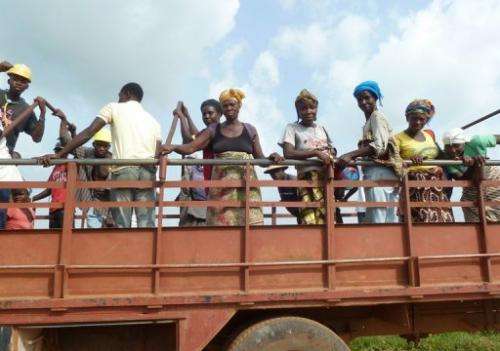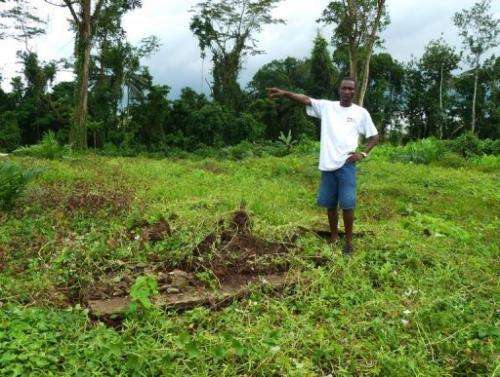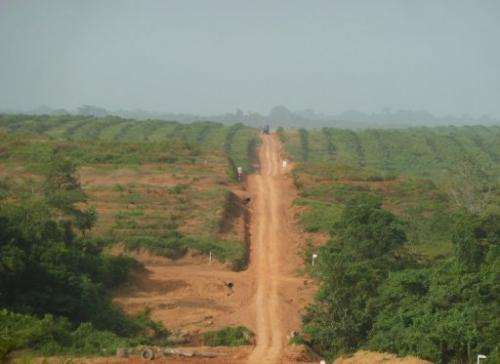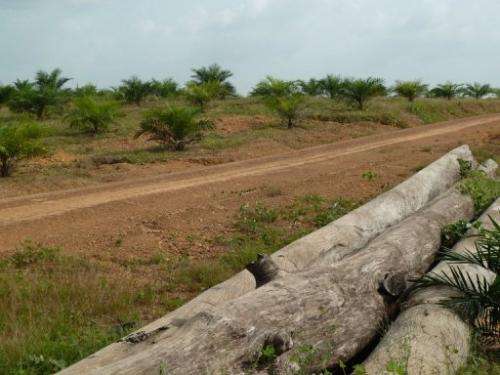Liberian farmers take on Indonesian palm oil giant

Liberian farmers who survived a 15-year civil war are now fighting lucrative property deals with Indonesian and Malaysian palm oil companies that threaten the land they live on, if not their sacred burial sites.
Thirty hours by car from the capital Monrovia, the green and yellow flag of Golden Veroleum Liberia (GVL), an Indonesian palm oil giant, floats over deforested hills in Sinoe County, southern Liberia.
Local farmer Benedict Smarts looked at the scene, and said: "We are not against development - but we want to be heard, we want respect—we want those people to listen to us."
In 2010, GVL acquired a 63-year lease on 220,000 hectares (544,000 acres) of land to produce palm oil.
It pays annual rent of $1.50 (1.10 euros) per hectare for virgin forest land and $5.00 per hectare for cleared terrain in the lease which is renewable for an additional 30 years.
Palm oil is used for cooking in parts of Africa, Brazil and Southeast Asia, and is an ingredient in soaps and washing powders.
GVL's lease was signed in Monrovia, without the presence of representatives from those who live in Sinoe County.
In the village of Plu, on the plantation's outskirts, inhabitants showed letters of complaint sent to the Liberian interior ministry.
"The Indonesians came here for the first time in September 2010," resident Benedict Manewah explained.
"They said: 'We have a concession agreement, your president has sold it to us'.
"Three months later they came back ... and they started to destroy the properties, farmlands, crops, livestock and houses."

Manewah listed the crops he had planted. "I had rubber trees, cassavas, breadfruits, orange trees, cocoas, coconuts and palm trees" for his family's personal consumption.
GVL workers uprooted his crops to produce palm oil exclusively, and "they ship everything to their people, at home" in Indonesia, he said.
Manewah pointed out a tiny parcel of land that contained the graves of relatives. It used to be tucked in the forest but was now surrounded by palm trees.
— Development, or 'modern slavery'? —
Saydee Monboe, whose black rimmed glasses lends him a certain resemblance to the late US civil rights activist Malcom X, pointed out that farmers now had no choice but to work under contract for GVL, charging: "This is not development, it's modern slavery."
Alfred Brownell, a lawyer who founded the organisation Green Advocates added: "Nobody is doing anything for the people in this country, they only have their land and now you tell them they have to leave."
He filed a complaint on behalf of local inhabitants, not with Liberian authorities, but with the international organisation RSPO (Roundtable on Sustainable Palm Oil) which groups industry stakeholders including growers, processors, traders, retailers, banks and investors.

Producers in Liberia adhere to RSPO, which was launched in 2003 by the World Wildlife Fund and industrialists, and delivers a certification for "sustainable palm oil".
The process requires that information be provided on how the oil was obtained, along with the approval by communities where it was produced, a point reiterated in December by RSPO Secretary General Darrel Webber in a letter to GVL executives.
In late 2011, RSPO upheld a complaint by Liberian villagers against Sime Darby (SD), a Malaysian grower that cultivates 200,000 hectares in Grand Cape Mount county.
Subsequent negotiations between the grower and villagers are ongoing.
"SD recognised the right of the communities to their food security and livelihoods," Brownell noted, "along with rights to compensation for shrines, and water resources affected by the practice of clear-cutting that wiped out the villager's food supplies.
He expected SD to pay more than $1 million in compensation over a 60-year period.

Imam Mustapha Foboi, who led resistance from 17 villages against the Malaysian company added: "We are making history not only in Liberia but in the whole of Africa: Grand Cape Mount has become a landmark case."
Since the petition from Liberia others from Cameroun and Gabon followed suit, and the RSPO is currently reviewing 34 complaints worldwide.
Brownell is nonetheless worried about the situation with GVL, calling it a "terrible case in a very remote area.
"The way they operate is almost as mob gangsters; threats, intimidation, illegal arrestations," the lawyer charged.
A day after they spoke with AFP for this story, four villagers were briefly detained by local authorities, something Brownell says has happened in the past as well.
Back on the plantation, GVL manager Jeff Benzin received AFP with a smile, saying: "When we made mistakes we admitted it.
"We pay compensation to any person who accepts it. When they specifically show us sacred sites, we stop everything," Benzin added.
But he also argued that palm oil "can save this country economically.
"Industry can collapse but agriculture is here to stay," Benzin vowed.
(c) 2013 AFP



















